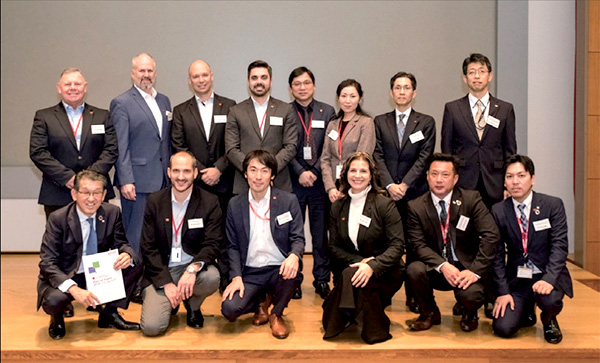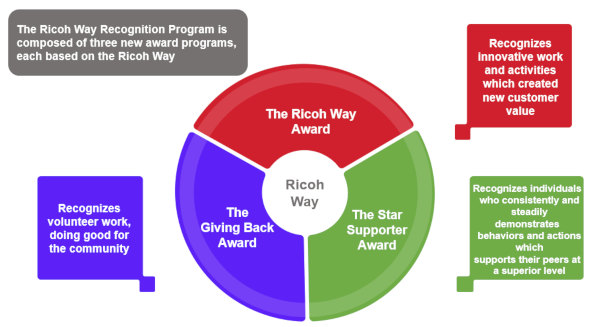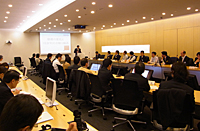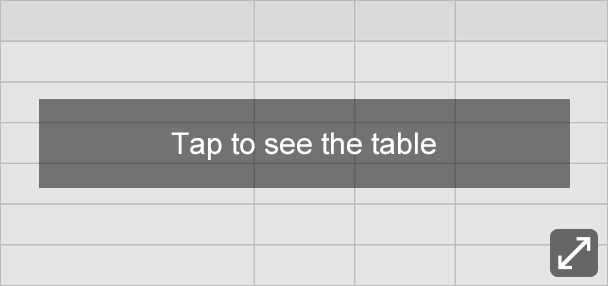- Home
- Sustainability
- Society
- Ricoh Way and Human Resource Management
Ricoh Way and Human Resource Management
Human resource management
Policy and Basic Concept
Responding to change
It is essential to build human resource management systems that can foster ongoing business growth amid dramatic social changes worldwide and intensifying competition. Group employees worldwide make decisions and act in keeping with the guiding principles of the Ricoh Way. On top of that, we continue to foster business leaders who can create new value and make appropriate judgements based on global standards, allocating these people strategically across the countries and territories in which we operate in line with efforts to build a global management system.
Instilling the Ricoh Way
Sharing values through the Ricoh Way
We undertake such efforts to ensure that all employees share our universal set of values. The Ricoh Way underpins everything we do, and is the basis for delivering on those values to customers around the world. Based on this common value, we are fostering a corporate culture in which our diverse human resources can demonstrate their individuality from customer perspectives, respect each other, create flexible and innovative ideas, and keep creating new customer value.
The Ricoh Way Recognition Program
We instituted the Ricoh Way Recognition Program in 2015 for all Ricoh group employees. The program honors those whose endeavors contribute conspicuously to new customer value or innovative improvement activities, in keeping with mission, vision, and values statement of the Ricoh Way. The numbers of applicants and winners of this program have grown every year, contributing to our corporate culture that recognizes and respects individuals.


Global employee engagement surveys
To be One Global Company based on a shared commitment to the Ricoh Way, we implement global employee surveys every year to listen to the views of our workforce from Ricoh Way perspectives and act on the results. Questions include job satisfaction, the link between the company's future and its operations, and whether they feel comfortable being themselves.
In fiscal 2023, the participation rate for this survey was 84.9%, and among these 87% of participants provided positive feedback on key indicators.
Survey findings are published via our website, intranet, and internal newsletters. We draw on these results to formulate and execute improvement action plans for the whole Ricoh group and individual business units.
Global top talent management
The Ricoh Group’s workforce rapidly reached around 90,000 people as a result of business expansions and mergers and acquisitions. Such growth made it vital to tailor our human resources management structure to the realities of accelerating globalization and give all employee opportunities to play meaningful roles in our organization.
The Ricoh Group Human Resources Management Policy accordingly prioritizes our enduring respect for basic human rights, and focuses on identifying and developing top talent throughout the world, including by instilling the Ricoh Way. Head office and group companies will continue collaborating to strengthen their human resources management systems.
Communication with employees
Freedom of Association
In Ricoh Group’s Human Rights Policy, we stipulate respect for the basic rights of employees as indicated in the International Bill of Human Rights and the International Labour Organization (ILO) Declaration on Fundamental Principles and Rights at Work.
Ricoh Group has the Human Rights Violation Prevention Standard, which stipulates that corporate activities and human rights taken into consideration in daily business activities. At the Standard, “Freedom of association” is specified as one of the important elements in respecting human rights. Each company has a place for dialogue with employees according to the circumstances of the country or region.
At Ricoh, from the founding spirit, we have an Employee Council in which all employees and executives are members. Employee Council has established with the aim of mutual communication between labor and management and collaborate under the basis of common values of business goals.
Employee Council

Ricoh Employee Council meetings are manifestations of our belief that employees are collaborators in the growth of our business. The Council’s central meetings serve as a forum for communication between senior executives and employees, with top management sharing information concerning the current state of the company and their management policies with representatives from all offices.
The information is subsequently conveyed to all employees through workplace meetings as well as through the Council’s newsletters. In addition, issues requiring top management consultation, such as pay raises, bonus payments and the Company’s annual plans, are discussed in special committees by members of the central meeting, and the results are passed along to top management.
Other topics discussed in this dialogue include employees' ideas on establishing and reforming a system, workplace improvement, work style reform, which are communicated and discussed between divisions involved and senior management.
